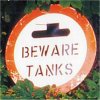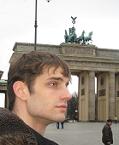Capitaine
Posts: 1043
Joined: 1/15/2002
Status: offline

|
After a few false starts where I kept getting creamed by the German AI for not entrenching my advancing units, I finally managed to play a coherent game as the Soviets. Below is the victory screen which shows my "Overwhelming" victory.
I can only say that this win didn't feel like a victory, much less an overwhelming one. My entire army was in the process of being destroyed and I was only saved by the bell of the game ending. This felt like a game of, say, France 1940 where the French win if they delay the Germans by an extra day or something. Nothing can stop a determined German onslaught so as the Soviet you just have to accept that any victory, even "overwhelming", will be decidedly Pyrrhic. I don't mind at all playing lopsided historical scenarios; after all, they happen and I want to see them modelled. I was just floored by having accomplished such a victory when I felt I was on the verge of annihilation.
I wanted to get a complete game under my belt before commenting. I like the SSG system a lot because I like hex and turn based games. My issue with at least this iteration of the engine was with the extreme mobility and actions allowed to the German units. Their constant shifting around to find favorable odds attacks kept breaking my immersion to remind me that this system and its AI are based on the prescient ability of being able to scramble around taking advantage of every high odds attack presented. Were this real life, none of this would be possible due to the immense traffic jams that would result from so much "passing of the lines". There is no AP cost for combat, nor for disengaging with the enemy. It's my opinion that there is simply too much movement available after combat. But I guess such is the cost of an effective AI?
I recently made a post about the "time and space" issue in turn based games in connection with 2by3's upcoming Eastern Front game.
quote:
I was rereading this thread and I agree with the design that Joel described in the game being a combined movement/combat turn-based system in order to increase the enjoyment of the game. Yet DiT's comments are not lost on me either. You need to limit a system to prevent multiple attacks on defenders that defy time and space due to the "activity point" system in play. And I agree with DiT that TOAW's system is too flawed to be implemented in other games due to distortions among widely separated units.
The key, to me, isn't in adjusting the AP levels of the phasing player, but in assigning an "activity point" limit to defending units in the opposing player's turn as well. When a defending unit is attacked, the movement used by the phasing player's attacking units, plus a variable amount of APs due to combat, is expended by both the attacking and defending units. Combat results would be partially a function of the length of time spent engaged with the enemy. Once a defending unit's AP level is expended in the other player's turn, that unit may not be attacked again in that turn. And if there are only a few AP's remaining, any additional attack would have a less extensive result than an initial attack that could use as much time as needed for combat resolution.
So, with this approach, a defending unit that, say, retreats after combat would be using APs to do so which would limit the ability of other phasing units to attack it. This approach also doesn't need any "proximity" or "universal" deduction of APs from other units of the phasing player. It automatically differentiates between attacks that are made by units already in attack position at the beginning of the turn and attacks by units made after making large AP expenditures just to move into contact with the enemy.
This approach would likely require standard AP levels and increments for all units, but different rates of expenditure depending on movement class and terrain (e.g. an AFV would spend less APs to cross a hex than an infantry unit, even though they'd have the same number of APs).
http://www.matrixgames.com/forums/tm.asp?m=1732154&mpage=5
Of course, the proof of the pudding is in whether the game is enjoyable and presents a challenge, while maintaining a colorable historical foundation. I guess what I'm saying is that while I enjoy the setting, the style, the graphics and the interface of this game, I was left rolling my eyes at the way combat repeatedly took place. It wasn't really exploitation or breakthrough combat, it was cherry picking made possible by extremely large movement rates and combat (including artillery barrages) that took no time at all to effect. All combat is literally instantaneous. I'm a long time veteran of board and computer wargaming and I just felt that the physics of this system were unreal. I didn't see how combat units could just constantly pull in and out of engagements and reshuffle themselves to attack again and again on a completely different vector. Then retire and set themselves up in defensive position as if the attacks never took place. It was too much like the old boardgaming tactic of finding the exactly correct mathematical combination of units to achieve the desired odds. Only taken to an extreme.
I feel like the AI kicked my butt, despite my victory. It was like solving a puzzle though; not like military strategy. And the AI, especially with the huge movement factors and combat ability of the Germans in Kharkov, are very good at solving puzzles. I too used the combat calculator a bit -- mainly to find my best hope of success -- but with the Soviets it was essentially "one and done", with much less mobility and reshuffling. I think that broadly speaking the operational decisions and strategy are valid here, but the tactical resolution of the game presents some serious questions to me. I'd like to see the tactical resolution more supported by conservative military abilities than what I've described in this post.

 Attachment (1) Attachment (1)
|
 Printable Version
Printable Version












 New Messages
New Messages No New Messages
No New Messages Hot Topic w/ New Messages
Hot Topic w/ New Messages Hot Topic w/o New Messages
Hot Topic w/o New Messages Locked w/ New Messages
Locked w/ New Messages Locked w/o New Messages
Locked w/o New Messages Post New Thread
Post New Thread